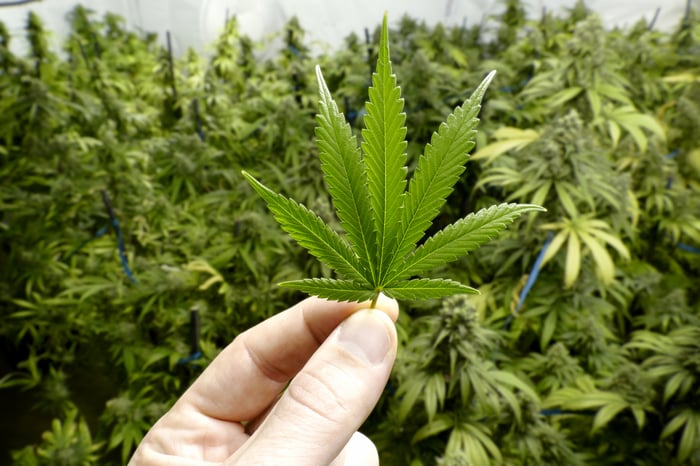The marijuana industry is growing at a breakneck pace, which is a big reason why investors haven't been able to stay away from marijuana stocks. A majority of the largest pot stocks (those carrying a $200 million market cap or higher) have doubled or tripled in value over the trailing year.
But this industry is about more than just double-digit sales growth. The public has also shifted its perception of cannabis in a big way. What was once viewed as a taboo topic is now a mainstream discussion. Nearly two out of three respondents in Gallup's October 2017 survey favored the idea of nationwide legalization. We witnessed Mexico legalize medical pot in June 2017, Canada push forward with legislation to green-light recreational marijuana by July 2018, and a multitude of U.S. states (29 in total) legalize cannabis in some capacity since 1996.

Image source: Getty Images.
The marijuana industry faces no shortage of hurdles
Yet, in spite of these steps forward for the North American marijuana industry, numerous hurdles remain. For example, the U.S. would almost assuredly be the most lucrative market for weed if it were legal. However, it remains a Schedule I substance at the federal level, meaning it's entirely illegal, has a high potential for abuse, and has no recognized medical benefits.
This scheduling creates a nightmarish scenario for pot businesses in the United States. To begin with, marijuana companies have little or no access to basic banking services, which even includes something as simple as a checking account. They also face effective corporate income tax rates of as high as 90% since U.S. tax code 280E disallows them the right to take corporate deductions. Lastly, researchers are buried under red tape as a result of pot's Schedule I classification, making it almost impossible to provide the benefit-versus-risk analyses lawmakers have requested.
These are just some of the financial concerns. Conservative lawmakers have also addressed worries about adolescent access if pot were legalized. Most legalization bills allow for a home-grow option, which opponents believe would allow easier access for kids. A few studies have suggested that regular or heavy marijuana use among adolescents can adversely impact their brains and/or memory capabilities.
There are also concerns about drivers getting behind the wheel after having used cannabis. Lawmakers worry about the enforcement of driving under the influence laws if the legal weed industry continues to expand.

Image source: Cannabix Technologies.
Get this small-cap pot stock on your watchlist
While there are no easy answers to many of these questions, the latter concern, regarding driving under the influence of cannabis, may soon have a solution thanks to Cannabix Technologies (BLOZF), a small-cap marijuana stock that should be on your radar.
The Vancouver, B.C.-based Cannabix Technologies is currently developing marijuana breathalyzer technology for law enforcement that could assist in their efforts to keep roads safe. What's unique about Cannabix's technology is that it would aid officers in detected recent cannabis use in a noninvasive way. You see, tetrahydrocannabinol (THC), the psychoactive component of cannabis, can stay in a person's system for days or weeks, meaning it can show up in blood or urine tests long after use. Cannabix's marijuana breathalyzer measures THC intoxication using breath samples, and is capable of distinguishing recent use in roadside traffic stops.
Just last week, the company provided an update on its Beta 3.0 prototype device, which is based on field asymmetric waveform ion mobility spectrometry (FAIMS). The device, the press release notes, is designed to be operated independently or in tandem with a conventional quadrupole mass spectrometer (MS) device. Cannabix believes that any marijuana breathalyzer test is likely to require secondary confirmation from a traditional MS test. The company's latest prototype includes enhancements to the ion source, which has improved sensitivity, and "its own tunable self-contained detector, which can be used in both independent FAIMS operation or in "pass-through" mode for tandem coupling directly with a MS device."
It's worth noting that Cannabix's pot breathalyzer may also have applications beyond law enforcement. For example, employers could use the device to test employees using heavy-duty or machine-operated equipment, such as forklifts, bulldozers, and so on.

Image source: Getty Images.
Before you get too excited, keep this in mind
However, investors should also be aware that this potentially game-changing technology comes with a couple of quirks -- at least at the moment.
Perhaps the biggest issue is that there aren't any predefined "limits" for law enforcement to work with when it comes to cannabis impairment. For example, if a driver is pulled over in the U.S., tested with a breathalyzer, and found to have a blood alcohol content (BAC) of 0.08% or higher, they are considered legally drunk and subject to arrest. Though an officer has the discretion to arrest or cite a driver below a BAC of 0.08% due to the belief of impairment, there is a very clear line in the sand of what's legal and illegal. There are no such lines in the sand with cannabis consumption, making it somewhat of a discretionary call each and every time for the officer. Until there are clear guidelines, breathalyzer use is sort of a moot point.
Secondly, understand that Cannabix Technologies isn't the only pony in town. San Francisco-based Hound Labs is also developing a competing marijuana breathalyzer that's been tested in the field with law enforcement. Since this is such a new technology, the first to market could indeed have a major advantage over the rest of the field, and Cannabix isn't guaranteed to be the first out the door.
Finally, keep in mind that Cannabix is still in the development stage of its existence. Though its prototypes are exciting, the company is still a ways away from generating recurring sales, and therefore nowhere near profitability.
There's no denying the critical role that a marijuana breathalyzer could play if the legal weed industry continues to expand, which is why this small-cap marijuana stock should be on investors' radars. However, it's also still years away from being a profitable technology, which means it probably doesn't deserve a place in your portfolio at this point in time.
